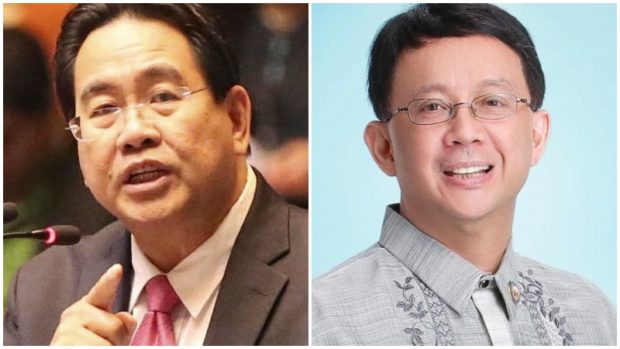
Cagayan de Oro Rep. Rufus Rodriguez and Senior Deputy Minority Leader Paul Daza (File photo from the House of Representatives)
MANILA Philippines — Despite the pronouncement by President Ferdinand Marcos Jr. that amending the Constitution was not a priority of his administration, a House of Representatives panel on Monday approved a resolution of both houses (RBH) calling for the formation of a constitutional convention (con-con) to amend the charter.
Cagayan de Oro Rep. Rufus Rodriguez, chair of the House Committee on Constitutional Amendments, assured the public that sufficient public consultations were held by the panel on the RBH, three in the lower chamber and another four in Cagayan de Oro City, Iloilo City, San Jose del Monte City in Bulacan province, and in Pampanga province.
According to Rodriguez, the in-house consultations held on Jan. 26 and Feb. 6 showed that 52 percent were in favor of the con-con mode, with 28 percent favoring only economic reforms. In the out-of-town public consultations, 93 percent of reactors were in favor of amending the Constitution, with 43 percent favoring con-con and 71 percent pushing for economic amendments.
Only three lawmakers, Deputy Minority Leader France Castro, Assistant Minority Leader Arlene Brosas, and Kabataan party list Rep. Raoul Manuel, opposed the RBH against 16 who voted in favor, while Senior Deputy Minority Leader Paul Daza abstained, preferring that Congress itself constitute a constituent assembly (con-ass) to ensure that amendments would be limited to the restrictive economic provisions of the Constitution.
Senate hurdle
Prior to the vote, Rodriguez said the push for a con-con was brought by the Senate’s past rejection of Cha-cha measures, remarking: “Right now they have pronouncements that it is not a priority. Constituent assembly will be difficult because of the pronouncements now of the Senate and the president.”
However, Daza said he could not understand why the committee would still push for a con-con that would be “open-ended and may get into the political provisions of the Constitution” that the Senate would be reluctant to address.
“I would think that it would be irrational and illogical that if we pass an enabling legislation for Con-con, the Senate would approve of that. It wouldn’t make sense,” he pointed out.
“My suggestion [is] why not the committee recommend limiting the amendments to the economic provisions through a constituent assembly and clarify, voting separately,” he said, noting that the Senate’s composition was different now and a constitutional assembly would be faster and cheaper and that the debate could be restricted to the economic provisions.
The House committee deferred approval of the RBH’s implementing bill, which would contain the details, including the composition, of the constitutional convention, on the request of some panel members to be given “a little bit of time” to study the provisions of the proposed legislation. The panel’s deliberation on the enabling bill will resume on Wednesday morning.
Daza, in seeking a deferment of the panel’s vote on the implementing bill, cited former Chief Justice Reynato Puno’s proposal of a “hybrid con-con,” where membership in the convention would come from election and appointments.
Puno on Monday shared his view to the panel that a hybrid constitution convention was the “best way” to amend or revise the Constitution, noting that “given the seeming deterioration of our political processes, there is the lurking danger that the elected delegates to a con-con, and pardon me for saying it, will just be proxies or factotums of political dynasties and economic oligarchs.”
Attempts
Several attempts to amend the Constitution have been made since the Ramos administration, but these never took off.
In 1997, a signature campaign, or people’s initiative, was launched, seeking a shift to a parliamentary system of government and the lifting of term limits on elected officials. The Supreme Court shot down the initiative, declaring that it lacked an enabling law.
Then-President Joseph Estrada pushed for charter change to allow foreigners to own land, public utilities, and media facilities. Strong opposition from the Catholic Church and other sectors forced Estrada to shelve the proposal in January 2000.
A people’s initiative called Sigaw ng Bayan was also launched during the administration of President Gloria Macapagal-Arroyo, but this was rejected by the Supreme Court in October 2006.
In September 2011, then-President Benigno Aquino III rejected an effort by then-Senate President Juan Ponce Enrile and Speaker Feliciano Belmonte Jr. to amend the economic provisions of the Constitution.
In May 2020, at the height of the COVID-19 pandemic, the Department of the Interior and Local Government (DILG) called on introducing amendments to the Constitution for economic and political reforms. Lawmakers from both the House and the Senate rejected this insistence of the DILG and said it was not the appropriate time.
In December 2022, the House Committee on Constitutional Amendments held its initial deliberations on various measures seeking to amend the Constitution.